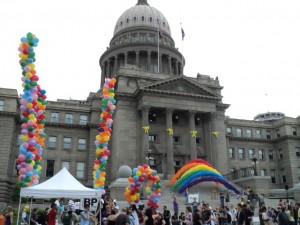The Phony Inevitability of Same-Sex Marraige
 Claims that something is inevitable are generally of two kinds. Sometimes the claim is simply a statement of fact (“Inevitably, the sun will rise tomorrow”). Other times it expresses a wish or perhaps a fear (“So-and-so is sure to be the next president of the United States”).
Claims that something is inevitable are generally of two kinds. Sometimes the claim is simply a statement of fact (“Inevitably, the sun will rise tomorrow”). Other times it expresses a wish or perhaps a fear (“So-and-so is sure to be the next president of the United States”).
The claim that same-sex marriage is inevitable in the entire U.S. is of the second kind–a rhetorical ploy by advocates who hope frequent repetition of the claim will bully opponents into a defeatist state of mind. For them at least, this makes perfectly good sense.
But it doesn’t make any sense at all for the opponents. In meekly accepting the claims of the other side as gospel truth, they put a damper on resistance and help make the inevitability of gay marriage a fact.
An instance of what I’m talking about was the dismaying reaction of a prominent prolife activist to the Supreme Court marriage decisions last month. One overturned a key provision of the federal Defense of Marriage Act (DOMA) while the other let stand, on procedural grounds rather than substantive ones, a lower court ruling against California’s Proposition 8 banning gay marriage in that state.
These were indeed victories for the same-sex marriage people but by no means final and definitive ones. Yet the person of whom I speak chose to call them the “rejection of marriage in America” while likening them to the Supreme Court’s action in the 1973 abortion decision Roe v. Wade.
This reaction was, to say the least, a bad idea. In Roe v. Wade, the Supreme Court asserted a constitutional basis for nationwide abortion on demand. This, however, is precisely what the justices did not do with same-sex marriage. Instead, they left the question–so far at least–up to the states. That’s the point opponents of gay marriage need to be emphasizing now.
There was something of the same troubling tendency to concede too much in Justice Antonin Scalia’s otherwise admirable dissent from Justice Anthony Kennedy’s obnoxious majority opinion in the DOMA case. Next time the question comes before the court, Justice Scalia declared, the majority can be counted on to ratchet up its approval of same-sex marriage to the level of national policy.
Maybe so. But then again–maybe not. Saying it’s inevitable doesn’t help.
One need not be Little Mary Sunshine in order to believe that this fight will go on. Thirty states have amended their constitutions to ban gay marriage, and the resistance in many of these will be fierce.
Significantly, too, public opinion on the issue varies vastly on a regional basis, ranging from over 60% support in New England–where all of the states recognize gay marriage–to over 50% opposition in the eight South Central states. For the most part, despite the strenuous efforts of the media, gay marriage, while enjoying predictably strong backing in culturally liberal areas, has yet to make significant inroads in the American heartland.
By religion, support ranges from over 80% among Jews and people with no religious affiliation to only about 30% among white evangelical Protestants. About 60% of Catholics are said to support gay marriage–but this figure obviously is skewed upward by the support of non-practicing Catholics.
People looking for motivation to resist need look no further than Justice Kennedy’s DOMA opinion. In effect, Kennedy told the world that opponents of same-sex marriage are hateful bigots. Of this one can only say that Supreme Court justices demean their office in stooping to name-calling to support their views.

